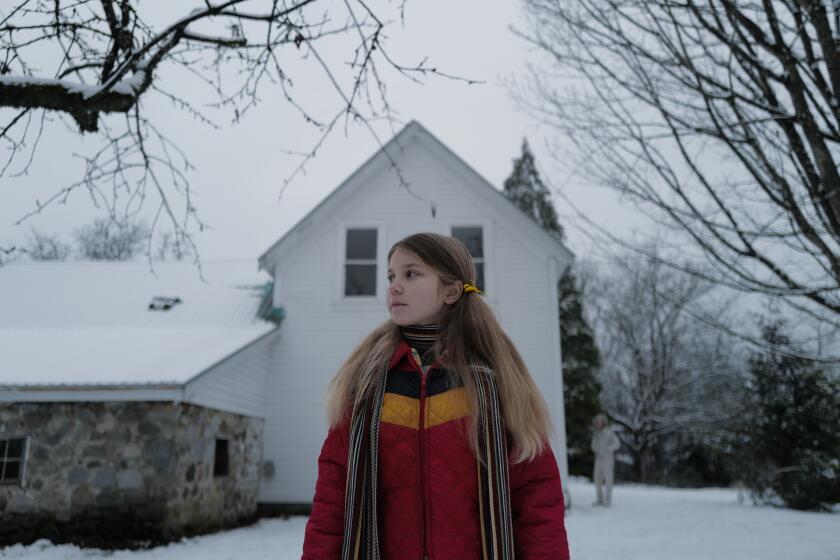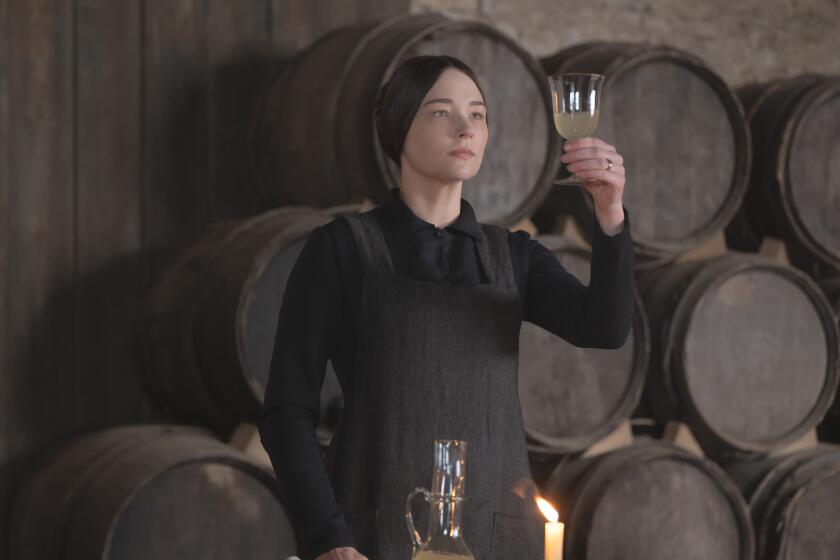MOVIE REVIEWS : Dangerous Games for Power and Fame : 18th-Century Love Games Produce ‘Dangerous Liaisons’
Improbable as it may seem, “Dangerous Liaisons” (AMC Century 14), which, as the book “Les Liaisons Dangereuses” outraged and scandalized the French in the late 18th Century, has kept every shred of its ability to shock in the late 1980s. You’d think that sexual deceit, treachery and betrayal would need new twists to appall us today, but the ones dreamed up by Choderlos de Laclos in 1792 do perfectly well.
The secret is that while his aristocrats may have played at love with more deliberation and certainly more panache, the dangers were exactly the same then as now: You did or you did not bring yourself to trust your lover, and having done so, most nakedly risked exposing yourself.
It’s a point the film makers underline by having us meet our two principals as they wake in their separate beds--alone for once--before taking on the trappings of the period. We watch them add the corset, the metal panniers, the choice of wig, the Louis-heeled shoe, the thick powdery makeup. They emerge as languid aristocrats, a Marquise and a Vicomte, but we’re reminded that they begin no different from any of us.
It’s a deft move, only one of many by screenwriter Christopher Hampton, who, with director Stephen Frears, has made a glidingly cinematic version of his own successful play, taken from De Laclos’ novel. If the screen version has chosen to underline some of its points a trifle for mass audiences, the encounter still remains a duel, not an attack with blunderbusses, and a glittering duel at that.
The practiced adversaries, the Marquise de Merteuil (Glenn Close) and the Vicomte de Valmont (John Malkovich), were once lovers. It is now a little later in the game; she wants to revenge herself on her most recent lover, who has spurned her to marry a virgin of 15, and she chooses Valmont--an epic libertine--as the instrument of her revenge.
Easy for him to seduce the convent-educated bride-to-be, Cecile de Volanges (Uma Thurman) before the wedding. Too easy, Valmont decides. Reputations like his are not kept with conquests this elementary. How much more challenging to seduce a woman known everywhere for her virtue, her happy marriage, her religious piety. He wants nothing less than “the excitement of watching her betray everything that’s most important to her.”
He has, you see, his prey in mind: Madame de Tourvel (Michelle Pfeiffer), exquisite as any of Wattau’s rosebud-nippled goddesses. She is even conveniently visiting the country estate of Valmont’s aunt (Mildred Natwick) while her husband is away on judicial business. To bring down such virtue, Valmont decides, would be the pinnacle of his rake’s progress and worthy of a reward from ex-love Merteuil--the promise of a night together.
And so, with Valmont and Merteuil masterminding them, the moves and counter-moves begin, with seductions, betrayals and counter-seductions, above and below-stairs, until the film is like one of those vast chess games played among formal gardens with living pieces.
Director Frears begins with several outright risks: He has chosen not to alter his American cast’s accents, and he has told his story principally in vast and powerful close-ups. The accents take a little getting used to, especially Swoosie Kurtz’s as the harried mother of the convent-bred victim. They are, at least, uniform (with the exception of Malkovich’s excellent manservant, Peter Capaldi, whose accent is Irish).
The close-ups finally become addictive, letting us read the most minuscule shifts in mood. They are particularly fascinating when Philippe Rousselot’s camera lens peers into the fox-face of John Malkovich, his hair shoulder-length the way he wore it onstage as Pale in “Burn This,” or at the whipped-cream uncomplicatedness of Pfeiffer.
But the close-ups lose something when Glenn Close is their subject, principally because Close has made Merteuil so overbearingly majestic that she very nearly swamps the picture.
Her Merteuil comes in under full sail, a ship of the line. We may be afraid of her power but not of any diamond brilliance or swiftness. The essential facet of Merteuil should be her light, stinging humor, but humor has always seemed the element left out of Close’s makeup. Venom, yes; malevolence, sure; intelligence, absolutely. But you need only to have seen her attack on her character in “Fatal Attraction” to understand Close’s essential humorlessness. (It would be interesting to know whose idea it was to have Merteuil wobble on her heel as she exits the opera at the end. Wretched excess.)
Close’s deportment does make heavy weather out of some of the scenes, particularly ones with Malkovich, who seems to have been born with irony in his veins. Oddly enough, Close’s presence isn’t enough to ruin the movie, particularly its second half, when Valmont tumbles into his own trap, and for the first time loses his control in the face of real feelings.
Pfeiffer seems reason enough for this plunge. Her scenes with Malkovich have the genuine trembling eroticism that this film must have. (Its R rating is for this and other sexual encounters and a modicum of nudity.) Yet most touching of all Pfeiffer’s scenes are her moments with Mildred Natwick, as Valmont’s marvelous 80-year-old aunt, unsurprised by anything she sees. Her ruminations on the essential differences between the way that men and women love are the film’s most telling, and, in Natwick’s hands, the most poignant.
In addition to its photography, the film’s details of costuming (by “The Last Emperor’s” James Acheson) and production design (by Stuart Craig of “Gandhi” and “The Mission”) are ravishing. Hampton and Frears have also employed a lovely flowing series of flashbacks throughout, although the word sounds too abrupt for such effortless and limpid transitions. (Mick Audsley, Frears’ customary editor would seem to shine here.)
“Dangerous Liaisons” is the first Frears film with a hefty budget; his trademark before this has been the small, incisive social commentary--”The Hit,” “My Beautiful Laundrette.” With the exception of a few peculiarities in sound, particularly in any of the sequences where people sing, and setting aside a piece of major casting, this seems a notable transition.
‘DANGEROUS LIAISONS’
A Warner Bros. release of an NFH Limited production from Lorimar Film Entertainment. Producers Norma Heyman, Hank Moonjean. Co-producer Christopher Hampton. Director Stephen Frears. Screenplay Hampton, based on his play and the novel “Les Liaisons Dangereuses” by Choderlos de Laclos. Camera Philippe Rousselot. Editor Mick Audsley. Music George Fenton. Production design Stuart Craig, art direction Gerard Viard, Gavin Bocquet, set decoration Gerard James. Costumes James Acheson. Sound Peter Handford. With Glenn Close, John Malkovich, Michelle Pfeiffer, Swoosie Kurtz, Keanu Reeves, Mildred Natwick, Uma Thurman, Peter Capaldi. Running time: 2 hours.
MPAA-rated: R (under 17 requires accompanying parent or adult guardian).
More to Read
Only good movies
Get the Indie Focus newsletter, Mark Olsen's weekly guide to the world of cinema.
You may occasionally receive promotional content from the Los Angeles Times.






